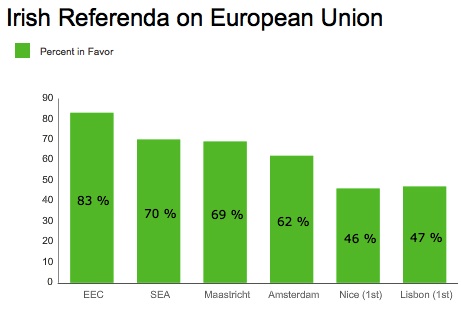It’s not as if the European Union needed to plan another landmine to explode the agreed “fiscal compact” from last December which, broadly speaking, would require EU countries to maintain a structural deficit of less than 0.5% of nominal GDP annually. 
With the anti-austerity candidate leading the polls in France and with Greek parliamentary elections scheduled for the spring, there is no shortage of political events that could cause yet another crisis in the eurozone. And after so many countries (including Germany!) violated the 1997 Stability and Growth Pact’s budget deficit rule (no more than 3% of GDP) throughout the 2000s, you might remain skeptical that any country would hew for very long to a 0.5% budget rule.
So the last thing anyone in Brussels wanted to hear was Dublin’s insistence last week that the fiscal compact will require an Irish referendum prior to its ratification.
Yet last week, Irish Taoiseach Enda Kenny announced that, on advice from the Irish attorney general, Ireland will be required to hold a referendum on the fiscal compact treaty. It was previously thought (hoped?) that an Irish referendum might not be necessary. Given that British prime minister David Cameron announced that the UK would veto the amendment of existing EU treaties, and the decision of the Czech Republic not to join the final version, the treaty is not a formal EU treaty, but an intergovernmental treaty among the remaining 25 EU members.
Under Crotty v. An Taoiseach in 1987, the Supreme Court of Ireland decided that any significant changes to any EU treaties to which Ireland accedes require an amendment to the Irish constitution prior to ratification, and therefore subject to a referendum.
Currently, polls indicate that 60% of Irish voters support the treaty, but the referendum date has not yet been announced and opponents will have ample time to mobilize.
If you look at the trajectory of the first-shot Irish referenda on various EU treaties, you would not necessarily be optimistic:
 Continue reading Will the Irish referendum stop the latest EU treaty? →
Continue reading Will the Irish referendum stop the latest EU treaty? →
![]()

